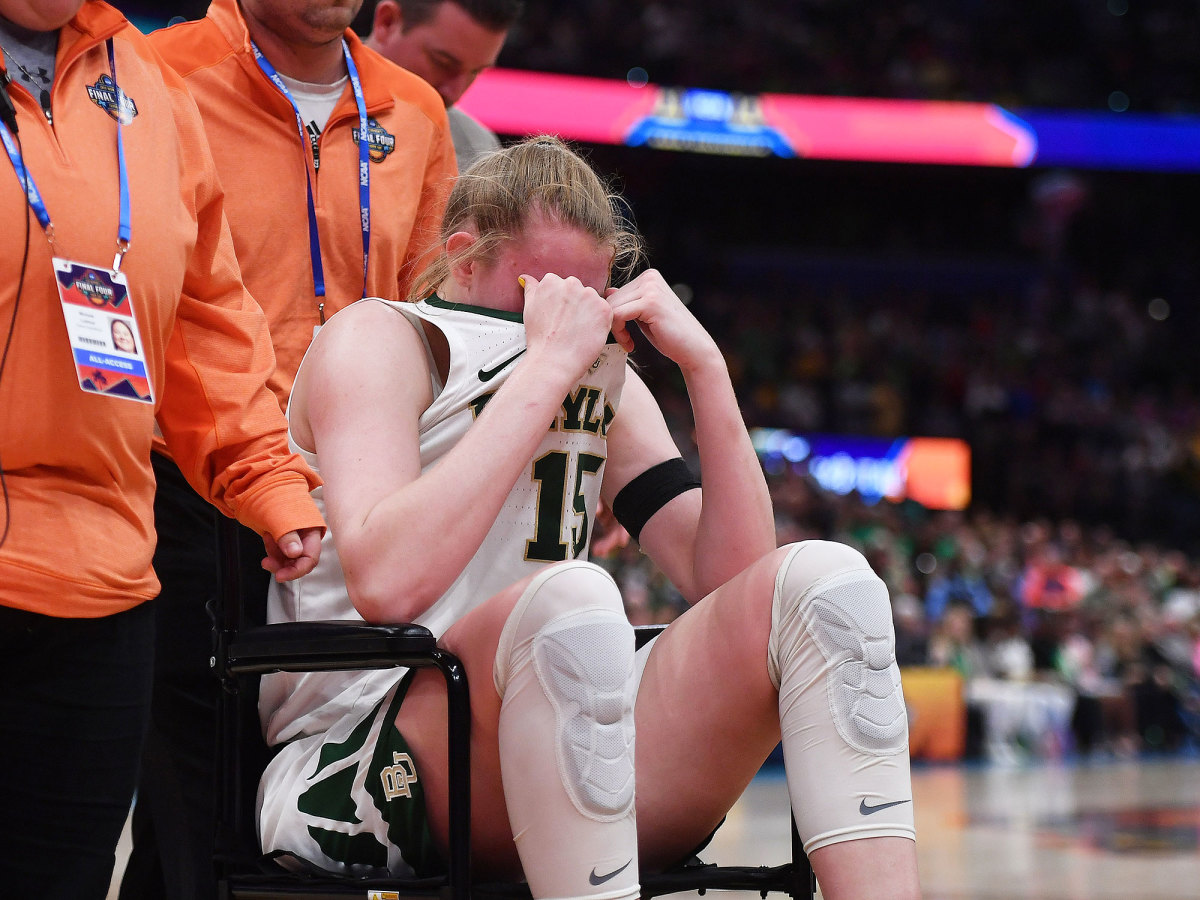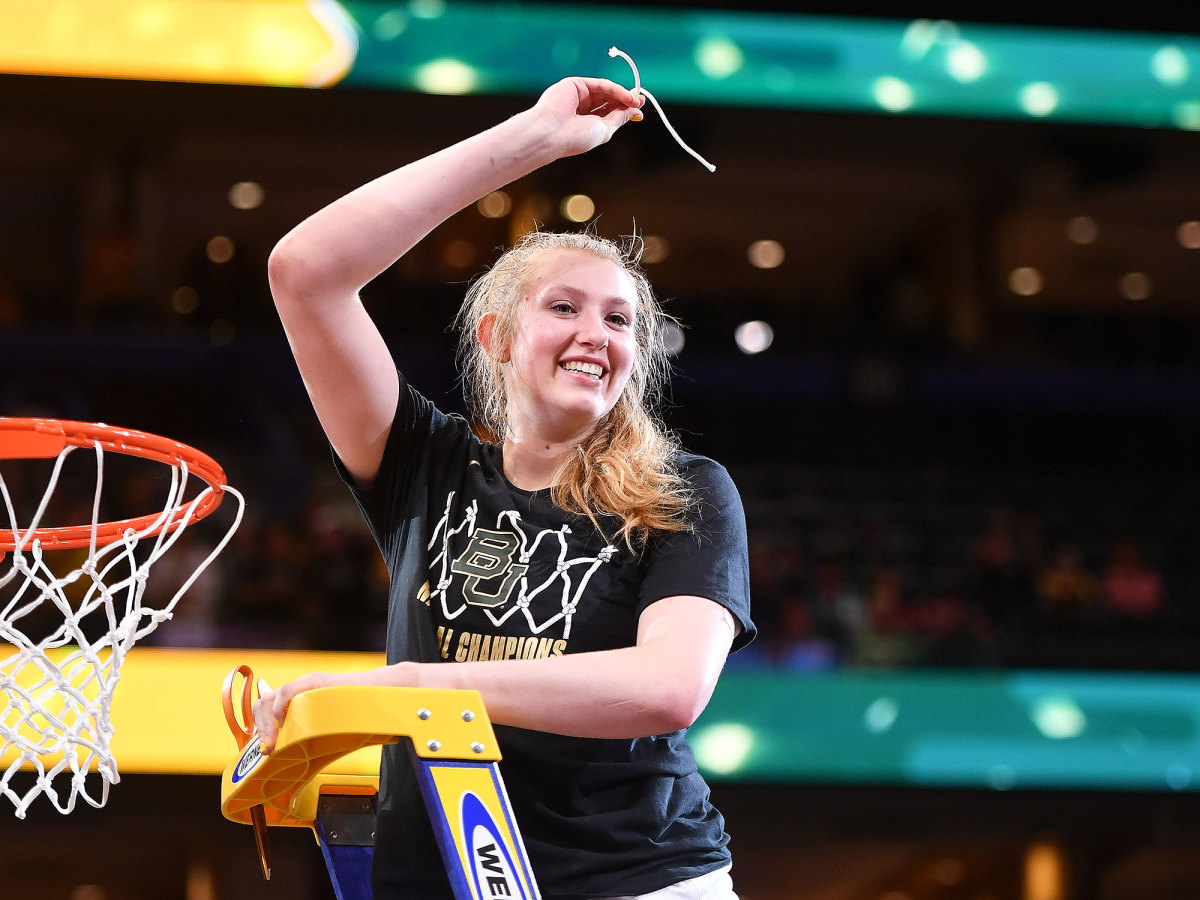After Title Game Injury, Lauren Cox Is Back to Lead Baylor's Chase for Another Championship


Baylor's 6'4" MVP stands on the baseline at practice drinking a juice box. She prefers apple because it hits her system quickly. And she just likes the taste. After guzzling it, Lauren Cox jumps right back into a half-court drill, raises her hands and intercepts a pass. About 20 minutes later her blood sugar has fallen again. She needs another juice, another corrective for a condition she's been battling most of her life. Another quick swig and she returns to the floor.
Cox has Type 1 diabetes, an autoimmune disease in which the body cannot produce enough insulin to regulate blood glucose levels. Since age seven she has been counting carbs, monitoring her blood sugar and either giving herself more insulin if her numbers are too high or eating a snack if they're too low. After her diagnosis, Cox's parents were given a quick tutorial on how to manage the disease; it was new to them. "But when we were walking out of the hospital, we told her, 'This isn't going to stop you, it's not going to hold you back, you can still do anything you want to do,'" her mom, Brenda, says. Lauren played in a soccer game the next day.
While these days the All-America senior center is unashamed of popping Skittles or Gummi Bears midgame—trainer Alex Olson also keeps granola bars and glucose tabs at the ready—she didn't become public about her diabetes until she was being recruited her senior year in high school. During middle school, if Cox was testing her blood sugar under the table at a restaurant, she'd quickly stop when the waiter came to take orders. If she needed to give herself an insulin shot at school, she'd head to the bathroom to do it. She was embarrassed of her condition, and she was shy.
But over time her talent left her nowhere to hide. After being ranked the nation's top recruit as a senior at Flower Mound (Texas) High, Cox won the Big 12 Sixth Man Award as a Baylor freshman, then was the conference's defensive player of the year as a sophomore and junior. "If you're just watching the ball, you don't understand or value what her presence on the floor means," Lady Bears coach Kim Mulkey says. "She knows where to be, how to help, when to block a shot, when to take a charge, when to get in the way. She just has a feel and a knack for what she needs to do to help her teammates."
At no time did the spotlight shine brighter on Cox than last April, when she went down with what looked to be a severe left knee injury with 1:22 remaining in the third quarter of the national title game, as Baylor was leading Notre Dame by 12. TV cameras followed her being whisked to the locker room in a wheelchair, then, after an 82–81 victory, zoomed in on her hoisting the trophy teary-eyed after she had hobbled back to the court on crutches. An MRI the next day revealed Cox had a sprained MCL and a bone bruise, not the feared ACL tear that would have sidelined her for her senior year. "If she was going to have to redshirt," says senior guard Juicy Landrum, "I would have redshirted with her."

Cox is not the first elite athlete to adjust her life to diabetes. Former NFL quarterback Jay Cutler, who was diagnosed at 25, would check his glucose level every time he returned to the sideline and drink Gatorade to raise his blood sugar if needed. Canadiens center Max Domi tests his sugar seven or eight times throughout a game.
New technology has made life easier for diabetic athletes. The company Dexcom introduced continuous glucose monitoring in 2006 to eliminate the need for fingerstick testing. Cox's G5 monitor, which is attached to her upper arm and covered in wrap, sends a number by way of Bluetooth to her insulin pump, which is small enough to tuck into her sports bra.
During the recruiting process Mulkey described the kind of support system Cox would have in Waco, with full attention from Olson and an endocrinologist. Brenda also tested Mulkey, asking, "If you're in the national championship game and Lauren's blood sugar is too high or too low, what are you going to do?" Mulkey simply said Cox wouldn't play. "I had a good feeling," Brenda says. "Coach Mulkey is a mom, too."
"It's the right answer," Lauren says, "but it's frustrating because I want to be on the court and playing."
In Cox's sophomore year, Baylor, then ranked No. 3, was preparing to play at eighth-ranked UCLA. Cox got strep throat and was hospitalized after developing ketoacidosis, which occurs when the blood acidifies because of an acute insulin deficiency. She was dehydrated, vomiting and couldn't get her blood sugar to go down. "We ended up losing, and I couldn't be there for my team," says Cox. Cox's health came first.
This past summer Cox participated as a mentor in the Juvenile Diabetes Research Foundation Children's Congress in Washington. Every two years more than 160 children living with Type 1 meet with lawmakers to advocate for research and help them understand the disease. She has also raised thousands through events on campus—like the JDRF's One Party in the president's suite at Baylor's McLane Stadium that brought in $50,000—and the Bears started an annual Type 1 awareness game during Cox's freshman year. (In this year's Baylor faced Lubbock Christian, where Lauren's sister Whitney, who also has Type 1, is a 6'1" forward.) While she didn't realize her impact at first, Cox started receiving messages from kids and parents thanking her for creating a path forward.
"I get calls all the time asking if Lauren can send a note or [people] telling me, 'Every time Baylor is playing, I try to get my kid to watch so they can see her,'" Brenda says. "It's supercool that she can be in a position to encourage kids. She didn't have that role model."

Early chatter has Oregon, led by reigning Wooden Award recipient Sabrina Ionescu, as the favorite to win the national title. But the Bears bring back nine players from the title team, plus freshman guard Jordyn Oliver and two graduate transfers, guard Te'a Cooper (from South Carolina) and center Erin DeGrate (Texas Tech).
Last year Cox, who models her game after WNBA MVP Elena Delle Donne, led the Big 12 in total rebounds (317) and blocked shots (97) and was second on her team in scoring (13 points per game). She also recorded 10 double doubles, including three straight in the Sweet 16 (vs. South Carolina), Elite Eight (Iowa) and Final Four (Oregon).
After months of rest and rehab—she wasn't able to go full tilt until July—Cox says she feels as strong as she did last year. Which is a good thing for Baylor, a team that feeds off her confidence. "If we're doing layup lines in practice, you don't want to be the one person who misses," says junior guard Didi Richards. "You know LC is going to be like, 'Come on, you gotta make that!'"
So what's in store for Baylor?
"Repeat," junior guard Moon Ursin says. "LC's back."
